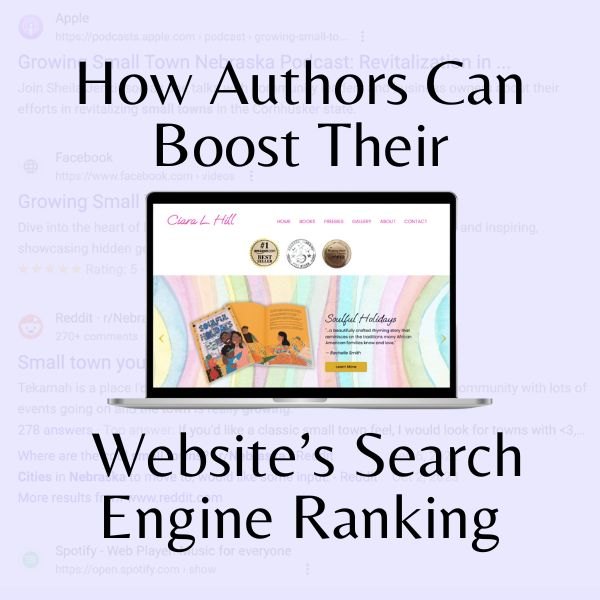How Authors Can Boost Their Website’s Search Engine Ranking

If you’ve ever Googled yourself or your book title only to find your website buried beneath a pile of results for Spotify, Facebook, or other giant platforms, you’re not alone. The good news? You can absolutely improve your website’s visibility in search results. The bad news? It’s not an overnight fix. But with consistent effort, you can make progress. Here’s how.
1. Use Your Own Domain Name
This is a biggie. If your site is currently on a subdomain like <https://yourname.wildinkpages.com>, you’re competing against your website builder’s main domain for search engine attention. Instead, invest in a custom domain name like <https://yourname.com> or <https://yourbooktitle.com>. It’s more professional, easier to remember, and carries more weight with search engines.
2. Create Quality Content Regularly
Search engines love fresh content. Update your site with blog posts, event announcements, book excerpts, or reader testimonials. Think about what your audience might be searching for and create content around those topics. For example, if you’ve written a historical fiction novel, you could write blog posts about the historical events or settings that inspired your book.
3. Get Other Websites to Link to Yours
Backlinks (when other websites link to your site) are one of the strongest factors in search rankings. Aim to get links from relevant and authoritative sites. Here’s how:
- Guest blog: Write articles for other authors’ blogs or industry sites and include a link to your website.
- Collaborate: Partner with other authors or book bloggers to share each other’s content.
- Press mentions: If you’ve been interviewed or featured in the media, ensure they include a link to your site.
Important: Always link to your custom domain, not a subdomain. Encourage others to use <https://yourname.com>, not <https://yourname.wildinkpages.com>.
4. Optimize Your Website for Keywords
Think about what readers might type into Google to find you. It could be your name, your book titles, or phrases like “best cozy mysteries of 2024” or “how to teach kids to dance.” Use these keywords strategically:
- Page titles: Include your name or book title in your website’s title tags.
- Headings: Use descriptive headings that include keywords.
- Image alt text: Add relevant descriptions to your images, like “Cover of [Book Title] by [Author Name].”
5. Build Internal Links
Help search engines understand your site structure by linking between pages. For example, on your homepage, link to your books page. On your blog posts, link to your contact page. This makes your site easier to navigate for both visitors and search engines.
6. Share, Share, Share
Every time you share your website link on social media or email, you’re giving it a little boost. Encourage your readers to share it too. More eyes on your site mean more potential for engagement and indexing by search engines.
7. Be Patient
SEO (Search Engine Optimization) takes time. You’re not going to outrank Spotify or Facebook overnight, and that’s okay. Focus on small, consistent steps: creating quality content, sharing your site, and building those backlinks. Over time, you’ll see progress.
By following these steps, you’re not just improving your search rankings—you’re creating a stronger online presence for your author brand. And that’s a win no matter what page of Google you’re on.
%20(1)_1718912244625.png?alt=media&token=ff7e6e75-c524-41cd-9202-fb41b2ac69be)